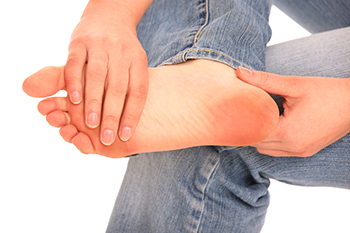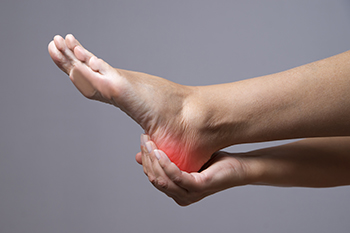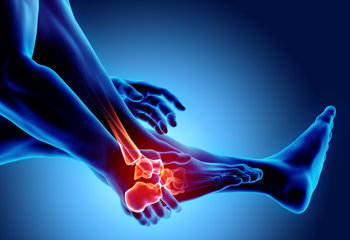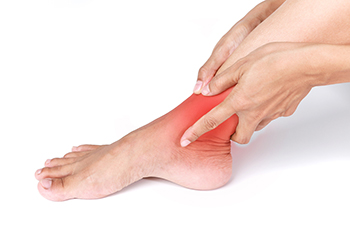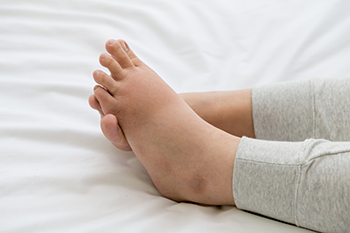
Swollen feet, an uncomfortable condition, can be attributed to various factors. One prevalent cause is poor circulation, where blood struggles to flow efficiently, resulting in fluid buildup in the feet. Prolonged sitting or standing, especially in hot weather, can trigger this. Additionally, injuries such as sprains or fractures can lead to localized swelling. Certain medical conditions, such as hypertension, kidney disease, and heart failure, can contribute to fluid retention in the feet and ankles. Hormonal changes during pregnancy also play a role in swelling. Lastly, an unhealthy diet that is high in sodium can exacerbate fluid retention. Addressing swollen feet requires identifying the root cause, maintaining an active lifestyle, and wearing comfortable shoes. If you have swollen feet, it is strongly suggested that you speak with a podiatrist who can determine the cause and offer correct relief and treatment remedies.
Swollen feet can be a sign of an underlying condition. If you have any concerns, contact one of our podiatrists of Foot & Ankle Centers of Charlotte County . Our doctors can provide the care you need to keep you pain-free and on your feet.
Swollen feet are a common ailment among pregnant women and people who stand or sit for extended periods. Aging may increase the possibility of swollen feet and patients who are obese often notice when their feet are swelling too. There may be medical reasons why swollen feet occur:
- Phlebitis - A condition that causes the veins to become inflamed and can also cause leg pain.
- Liver disease - This may lead to low blood levels of albumin which is a protein. This can cause fluid in the blood to pass into the tissues and several areas of the body can become swollen.
- Heart failure - When the heart doesn’t pump properly the blood that is normally pumped back to the heart can pool in the veins of the legs causing swollen feet.
- Kidney disease - One of the main functions of the kidneys is releasing excess fluid in the body. This type of condition can make it difficult for the kidneys to function properly, and as a result the feet may become swollen.
- Deep-vein thrombosis (DVT)- This is a serious condition where blood clots form in the veins of the legs. They can block the return of blood from the legs to the heart which may cause the feet to swell. It is important to be treated by a podiatrist if this condition is present.
Swollen feet can also be caused by bone and tendon conditions, including fractures, arthritis, and tendinitis. Additionally, there may be skin and toenail conditions and an infection may cause the feet to swell. Patients who take medicine to treat high blood pressure may be prone to getting swollen feet.
Many patients elevate their feet to help relieve the swelling and this is generally a temporary remedy. When a podiatrist is consulted the reason behind the swelling can be uncovered and subsequently treated.
If you have any questions please feel free to contact our offices located in Punta Gorda and Port Charlotte, FL . We offer the newest diagnostic tools and technology to treat your foot and ankle needs.
